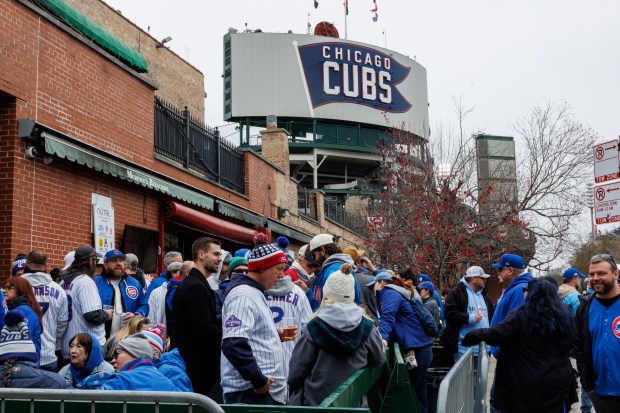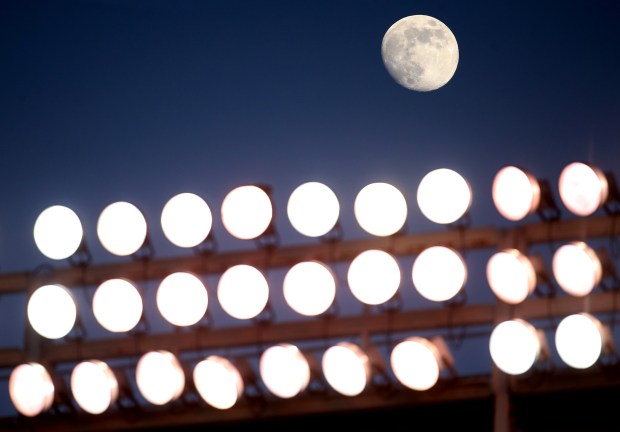The Major League Baseball All-Star Game is coming to Wrigley Field.
Yeah, probably.
It’s going to make the city a ton of money, promote tourism and give the world a true picture of our town.
Um, hopefully.
And the real winners will be the Chicago baseball fans who will get MLB’s crown-jewel midsummer event — the Home Run Derby — and the All-Star Game to boot.
Well, assuming they have access to pricey tickets and don’t have to stand on Waveland Avenue waiting for home runs like the ballhawks.
The Chicago Cubs have denied a report by their flagship radio station that the team has been awarded the 2027 All-Star Game, but never mind that small detail. No one believes them, so let’s start getting excited before it is made official.
But first, a brief history lesson is in order.
The last All-Star Game at Wrigley occurred in 1990, but the Cubs first began talking about getting it four years before it happened, when then-general manager Dallas Green brought it up at the 1986 game in Houston.
There was one big holdup to the bid. Major League Baseball wouldn’t award it to the Cubs unless they installed lights at Wrigley Field, the only baseball park that scheduled 81 day games. The All-Star Game was a prime-time event.
Tribune Co., then the Cubs owners, already wanted lights to televise prime-time games on its WGN-TV superstation, which would add to the company’s revenues. Neighborhood groups fought against lights, warning that night games at Wrigley would lead to more crime, noise and parking problems and general havoc during and after games.
After a long, drawn-out battle, the Chicago city council voted on Feb. 25, 1988, to allow eight night games that year and up to 18 in future seasons. Shortly before the vote, then-National League President Bart Giamatti called Mayor Eugene Sawyer and informed him Chicago had been selected as the 1990 All-Star site under the stipulation the city council approved the lights measure.
So the Cubs ended their day-games-only tradition for money and the promise of a big event. The team estimated the city would get $15 million to $35 million in revenue for the Cubs hosting the game, which was considered a lot in those days.
“There will always be day baseball at Wrigley Field,” pitcher Rick Sutcliffe told the Tribune after the vote. “It may not be 81 games a year, but the majority will always be during the game there. That’s something special.”
The 1990 All-Star Game went off without a hitch, despite of a rain delay. The Cubs eventually added to their night-game demands, and almost half of the team’s 81-game home schedule is now played at night. Wrigley and the neighborhood both survived.
Day games are no longer as special, but that’s the price of progress. The Cubs added a video board in 2015, ending another tradition and making them more generic. But they’re still the Cubs, and most fans have lauded the Rickettses’ ballpark renovations.
Now the Cubs reportedly are in line for another All-Star Game at Wrigley in 2027, and like the 1990 game, they’ll need help from the city council. MLB has long sought added security measures around the ballpark in order to reward the Cubs with the event, and Ald. Bennett Lawson (44th) on Wednesday introduced an ordinance to the city council that would allow the Cubs to install removable “anti-terrorism” bollards around Wrigley Field.
The measure would cost more than $32.1 million, according to the ordinance, with the city responsible for $10 million or one-third of the cost, whichever is less. The cost to the Cubs would be a minimum of $8 million, including any overruns. The state of Illinois also would contribute about one-third.
If that ordinance is approved, the Cubs believe they’ll get the official nod from MLB to host the 2027 All-Star game, a team source said. It would be a huge win for the city and the team and generate hundreds of millions of dollars.
Unfortunately for the Cubs, a report from WSCR-AM 670’s Bruce Levine on Thursday, labeled as “breaking news,” declared MLB approval was a done deal and the game is coming to Chicago. The report was later clarified to say an official announcement would be made this summer.
The Cubs promptly denied there was any agreement with MLB. A spokesperson told the Tribune and other media outlets Thursday that MLB had not made a decision on the All-Star Game.

On Friday there was nothing on the Cubs website or Marquee Sports Network’s website about the initial report. But WSCR-AM 670 doubled down and continued reporting that the Cubs definitely would host the game.
I called Cubs spokesperson Jennifer Martinez and asked if there had been any change overnight. Martinez repeated that “MLB has not made a decision.” A request to interview any Cubs officials was denied.
It had all the ingredients of a wacky headline from the Onion: “Cubs deny report leaked by Cubs to a Cubs beat reporter on the Cubs’ radio station.”
Except that’s apparently what happened.
Asked again if the Cubs were saying the Score’s report was inaccurate, Martinez repeated her statement that no decision was made.
Here’s the tricky part: Levine, a veteran reporter with close ties to the Cubs, works for both WSCR and Marquee Sports Network, which the Cubs own. The topic did not come up when Levine appeared Friday on the Cubs pregame show on Marquee.
The Cubs have complete say over what goes on the network, which is why you seldom hear a critical word about the team, unlike the White Sox’s pre- and postgame shows, on which analyst Ozzie Guillén frequently skewers the Sox with the tacit approval of Chairman Jerry Reinsdorf. Marquee once stopped the taping of a program in which reporters from other media outlets criticized Cubs President Jed Hoyer, then retaped the segment after asking the reporters to go in a different direction.
If Marquee is like Fox News, the Score is closer to CNN.
WSCR is the Cubs’ flagship radio station, but the team has no control over what’s said on its airwaves. Several hosts have been critical of the team — and Chairman Tom Ricketts — over the years, adding to the station’s credibility.
But the station’s website posted a story on Levine’s All-Star Game report that had no byline and no mention of the Cubs’ denial. A response from the Cubs might have changed the narrative, but it was still necessary to ask for one. The many journalists who work at the Score might want to remind Audacy management of how the reporting business works.
Levine addressed the All-Star report Saturday on his “Inside the Clubhouse” show on the Score, saying he believed the city council’s approval of the bollards ordinance was a “slam dunk” and repeating that the Cubs have been awarded the game.
Asked about the Cubs’ denials by co-host David Haugh, Levine incorrectly said “the Cubs aren’t pushing back on it.” He added that Mayor Brandon Johnson eventually would announce the news along with Ricketts and business operations president Crane Kenney.
“They’re not going to confirm breaking their own story,” he told Haugh. “They want to break it on their own.”
They did break it on their own, albeit through a selected reporter, then denied it.
Why now? Who knows?
Either way, the story is out there and fans are eagerly anticipating the 2027 All-Star Game. But Ricketts and Kenney don’t have to answer any pesky questions about it from the media since the Cubs are denying their own leak. “Radio-Free Crane” works in mysterious ways.
The leaking of the news puts the city council in an awkward position. If MLB hasn’t made a decision, the council can put the kibosh on the All-Star Game by voting against the bollards ordinance. If it rubber-stamps the ordinance, the city is spending taxpayer money on the Cubs that the team’s owners easily can afford.
We’ve come a long way since 1988, from using the All-Star Game as a cudgel to get the Cubs their lights at Wrigley to using an All-Star Game to get the Cubs their bollards outside the park.
Do Chicago taxpayers think helping the billionaire Cubs owners pay for the bollards is an appropriate use of our tax dollars? Should the Cubs pay for their own security improvements if they really want an All-Star Game?
I’ll hang up and listen for the answer.



